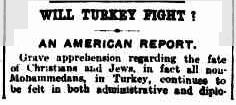
Queensland newspaper reports in mid-October 1914 revealed a growing anxiety about the intentions of Turkey and its relationship to Germany and Austria. An article in the Brisbane Courier on the 17th October paraphrased a New York Tribune report, and discussed the ‘danger of wholesale persecution of all non-Mohammedans in the event, which is regarded as highly probable, that Turkey decides to espouse the cause of Germany and Austria’.
Diplomatic confirmation seemed difficult to achieve at the time the report was published, but the article suggested that ‘those better informed regarding conditions in the Ottoman Empire are apprehensive, and believe that every Christian should avail himself of the first opportunity to leave the country’, a view shared by most European diplomats in Washington.
In the deteriorating situation, with strict censorship established over the newspapers of Turkey, funds were being extended to stranded Americans. The United States sought support from the Powers of Europe to send a warship to Turkey, ostensibly to aid and protect Americans, and the French Government increased the extreme tension by accusing Germany of ‘trying to stir up anti-Christian sentiment in Turkey by provoking the Mohammedans against the English and French’. European diplomats generally admitted that the situation was daily approaching a crisis, and that a Turkish declaration of war was imminent.
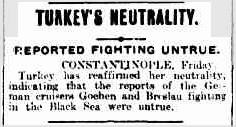
In a conflicting article on the 19th October, the Brisbane Courier reported that Turkey reaffirmed her neutrality, indicating that the reports of the German cruisers Goeben and Breslau fighting in the Black Sea were false. Soon enough however, Turkey’s real position became clear. The Goeben and Breslau were renamed and taken into the Turkish navy, and on the 29th October they took part in the attack by the Turkish fleet on Russia’s ports in the Black Sea, marking the Ottoman Empire’s official entrance into the First World War.
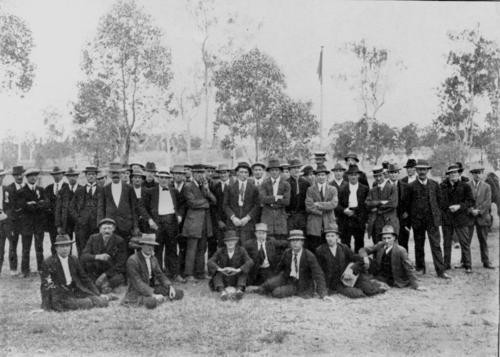
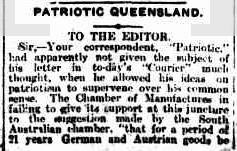
Letters to the Editor of the Brisbane Courier also voiced differing opinions. A letter by ‘Patriotic’ published on the 16th October suggested that Australia, indeed the Commonwealth should cease trade with Germany, not just for 21 years as recommended by the South Australian Chamber of Manufacturers, but rather indefinitely. A letter published on the 19th October in response to ‘Patriotic’ agreed that while there may not be wisdom in ‘depending upon countries up to 15,000 miles away for the finishing of our raw productions’, of equal concern was the potential redirection of trade to the United States, ‘the adopted country of the German-American Alliance, whose hundreds of thousands of people are getting a lot of our trade, while inflaming the rest of the nations through their Press and other ways, against everybody and everything British’. This correspondent felt that ‘the unearned increment of trade should not be allowed to pass to any powerful nation, now waiting round the back door, while her help, which can be so valuable, is withheld’.
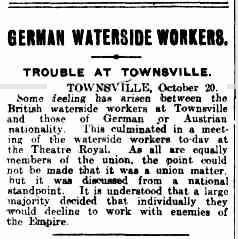
Anti-Germanism also continued to emerge in Queensland during October, with tension building between British waterside workers at Townsville and those of German or Austrian nationality, and culminating in a meeting of the workers at the Theatre Royal. As all were equally members of the union, the issue could not be considered a union matter, but was discussed from a national standpoint. A large majority of workers decided that ‘individually they would decline to work with enemies of the Empire’.
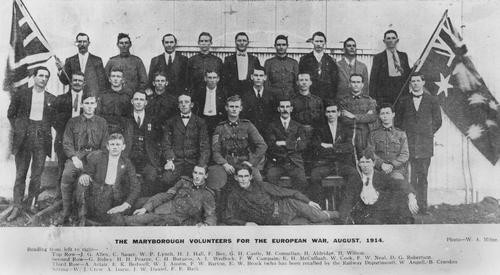
Each week we will be sharing news stories from the week 100 years ago, and we invite you to add your thoughts and comments.
Want to join in and find and correct newspaper articles from 1914 and 1915? Here’s more information about how to get started text correcting newspaper articles on Trove as a Pitch In! digital volunteer.
If you find something you’d like to share we’d love to hear from you at discovery@slq.qld.gov.au
Comments
Your email address will not be published.
We welcome relevant, respectful comments.